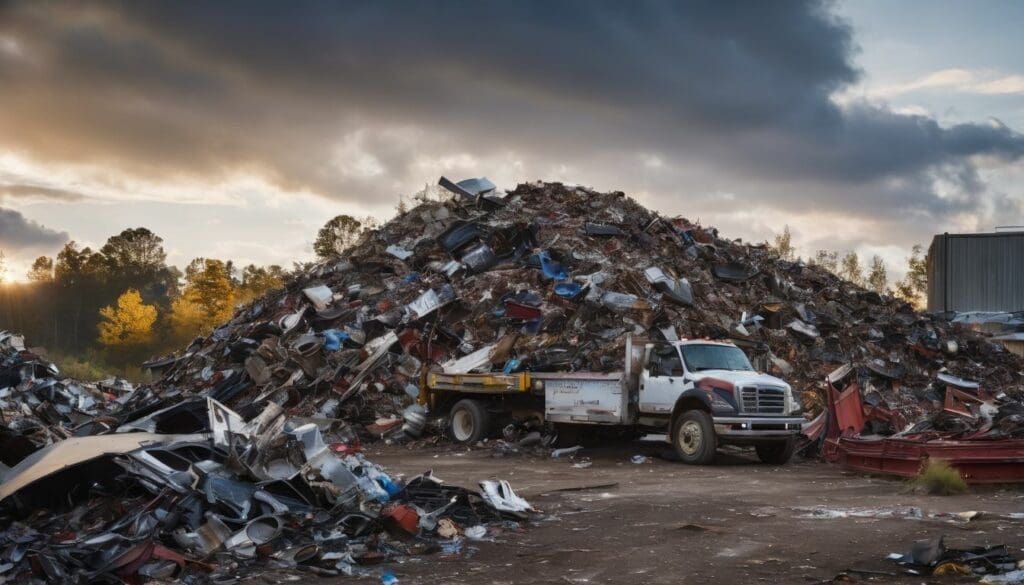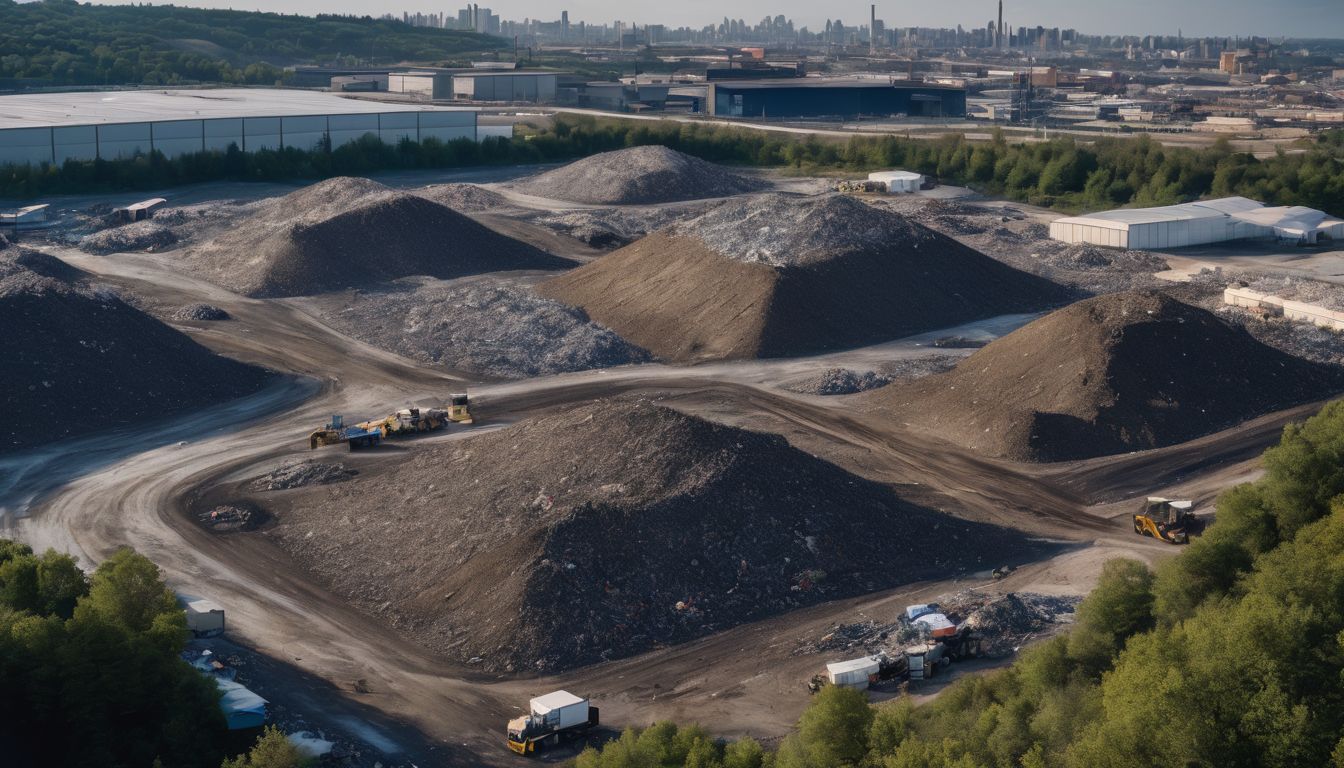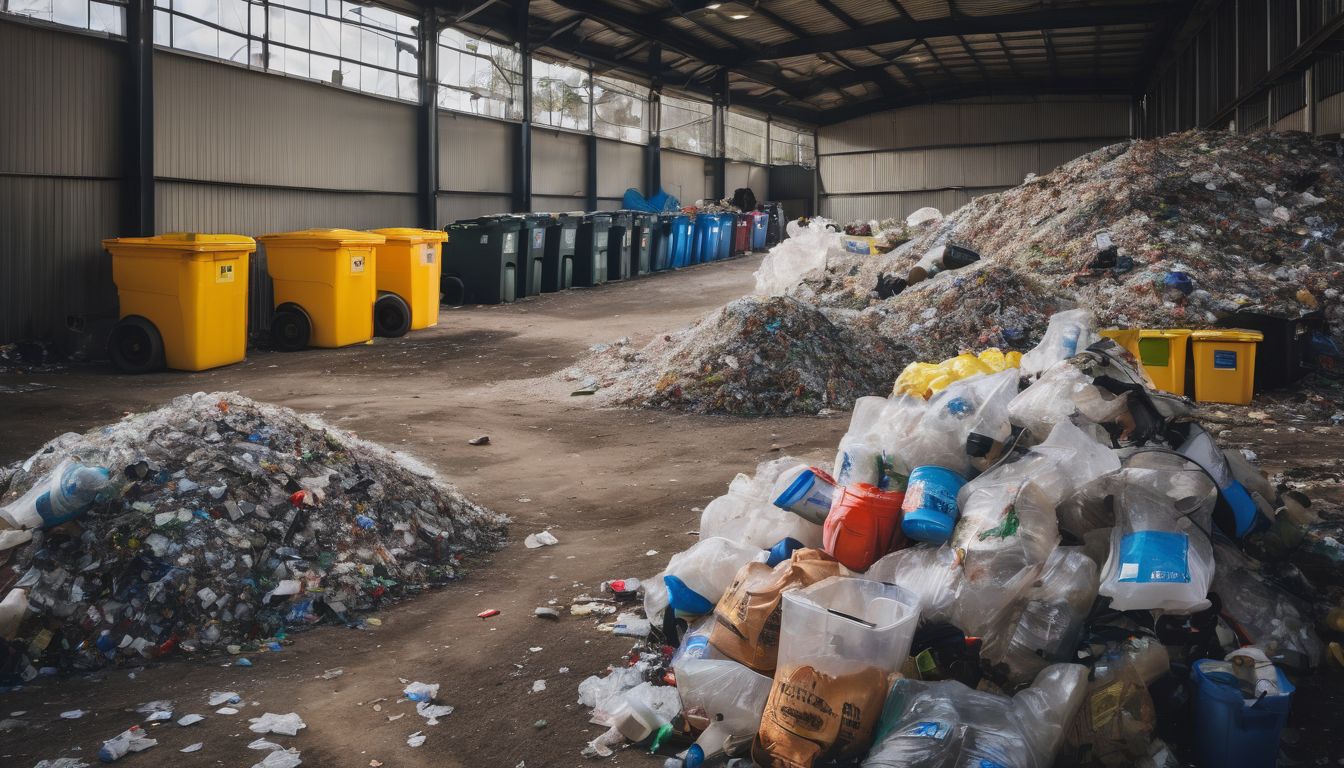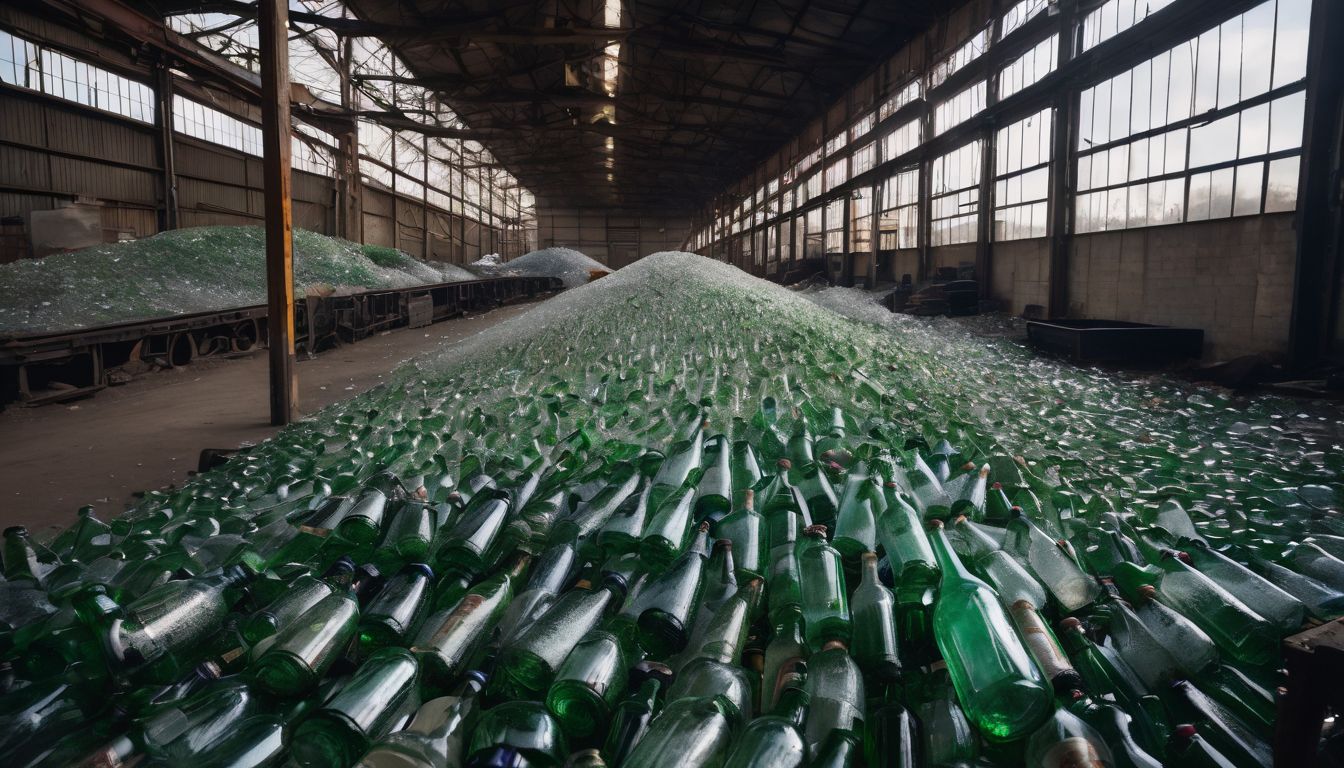Every day, we see heaps of scrap metal, often unaware of its hidden worth. Recycling metals could save enough energy to power millions of homes each year. This blog post will show you the incredible journey your discarded soda can takes to become something new and valuable again.
Dive in for a story full of transformation!
Key Takeaways
- Metal recycling conserves precious natural resources such as iron ore and coal, reducing the need for mining and helping to sustain these materials for future use.
- The process significantly cuts down on energy consumption, with recycled metals requiring less energy to produce than new metals from raw materials.
- By diverting scrap metal away from landfills, metal recycling minimises environmental pollution and helps manage waste more sustainably.
- This practice not only creates numerous jobs across various sectors but also supports economic growth by providing cost-effective raw materials for manufacturing processes.
- Recycled metals maintain their quality even after multiple recycling cycles, offering an array of options like melting or upcycling for creating fresh products without depleting more resources.
The Environmental Benefits of Metal Recycling
Metal recycling helps to preserve natural resources by reducing the need for new metal production and mining, thereby protecting the environment from the negative impacts of resource extraction.
It also plays a crucial role in decreasing energy consumption and landfill waste, contributing to a cleaner and healthier world for future generations.
Preserve natural resources
Recycling metals plays a crucial part in conserving our planet’s valuable resources. Each time metal is recycled, we save raw materials like iron ore, coal, and limestone. These resources are finite; by recycling, we ensure that they last longer for future generations to use.
Think of it as giving the Earth a much-needed break from constant mining and extraction activities.
This sustainable practice not only safeguards natural assets but also supports a circular economy where materials cycle continuously without unnecessary waste. Next up: discover how metal recycling drastically cuts down energy usage in the industry.
Reduce energy consumption
Metal recycling significantly reduces energy consumption. By using recycled metal, we conserve a substantial amount of energy compared to producing new metal from raw materials. The entire process, from mining and transportation to refining and shaping, demands less energy when working with recycled material.
This practice aligns with sustainable principles, contributing to the preservation of natural resources and reduction of greenhouse gas emissions.
In addition, reusing metals instead of extracting them through traditional methods lowers the demand for fossil fuels and decreases our reliance on non-renewable energy sources. Embracing metal recycling is an effective way to promote a more sustainable future while also positively impacting the environment and economy.
Decrease landfill waste
Metal recycling plays a crucial role in decreasing landfill waste. When metal products are thrown away, they often end up in landfills where they take up space and contribute to environmental pollution.
By recycling metals instead of disposing of them, we can significantly reduce the amount of waste sent to landfills each year. This process not only helps preserve natural resources but also minimises the harmful impact on the environment as well as reduces the need for additional landfill sites.
Recycling metal is an effective way to combat the overflowing issue of landfills being filled with non-biodegradable materials like metals. By opting for metal recycling, we actively participate in reducing our environmental footprint and contribute to sustainable waste management practices that benefit our planet’s future and ecosystems.
The Economic Benefits of Metal Recycling
Metal recycling creates job opportunities and boosts the economy by providing raw materials for manufacturing processes. It is also a cost-effective way to reduce the need for new metal production, ultimately benefiting the US economy and trade balances.
Creates job opportunities
Metal recycling creates job opportunities in various sectors, from collection and sorting to processing and manufacturing. This industry provides employment for a wide range of professionals, including engineers, machine operators, truck drivers, and environmental specialists.
By supporting metal recycling initiatives, individuals can contribute to the growth of this sector and help create more sustainable jobs within their communities.
In addition to direct employment, metal recycling also fosters secondary job opportunities in related industries such as transportation, logistics, and research & development. As the demand for recycled metals continues to rise, so does the need for skilled workers who can innovate new technologies and processes.
Boosts the economy
Metal recycling significantly boosts the economy by creating job opportunities and contributing to cost-effectiveness. Recycling metal products generates employment in collection, processing, and manufacturing sectors, thus stimulating economic growth.
Additionally, it reduces the demand for raw materials, lowering production costs for various industries. This cost-effective approach positively impacts the UK trade balance by reducing reliance on imported raw materials and promoting domestic resource utilisation.
Furthermore, metal recycling encourages sustainable practices that benefit local communities and businesses. By efficiently using resources and reducing waste going to landfills, metal recycling supports a thriving economy while preserving natural resources for future generations.
Cost-effective
Metal recycling is a cost-effective solution for both businesses and individuals. By recycling metal, it reduces the need for costly mining operations and helps in saving energy used in the production process, making it an economically viable choice.
Additionally, when metal is recycled, it can be repurposed into new products at a lower cost than manufacturing from raw materials.
Moving on to “The Role of Metal Recycling in a Circular Economy,” let’s explore how this process contributes to sustainable resource management and environmental conservation.
The Role of Metal Recycling in a Circular Economy
Metal recycling plays a crucial role in a circular economy by conserving resources, reducing greenhouse gas emissions, and contributing to a sustainable future. Read on to learn more about the significance of metal recycling.
Helps conserve resources
Conserving resources is a key benefit of metal recycling. By reusing and repurposing metals, there is less need for mining, which reduces the environmental impact of resource extraction and preserves natural reserves.
Recycling also minimises the energy required to produce new metal products, contributing to energy conservation and sustainability.
Metal recycling plays a vital role in reducing waste by keeping valuable materials out of landfills. This not only conserves resources but also decreases landfill waste, promoting a more sustainable approach to managing our environment and supporting renewable practices.
Reduces greenhouse gas emissions
Metal recycling significantly reduces greenhouse gas emissions. By using recycled metals instead of virgin materials, the need for mining and processing is decreased, leading to lower carbon emissions.
This process helps in supporting a more sustainable future by conserving energy and reducing the environmental impact of metal production. Reusing metal products also minimises the release of harmful gases into the atmosphere, making it an essential practice for those who are environmentally conscious.
Additionally, sorting metals in recycling plants plays a vital role in cutting greenhouse gas emissions compared to traditional extraction and refining processes. The reduction in mining activities further contributes to this positive impact on greenhouse gas levels, aligning with conservation efforts aimed at combating climate change while promoting a greener planet.
Contributes to a sustainable future
Metal recycling contributes to a sustainable future by conserving natural resources and reducing the need for environmentally damaging mining activities. By reusing metal, we can help decrease greenhouse gas emissions, leading to a healthier planet for future generations.
Taking part in metal recycling at home or within communities enables us to play an active role in waste reduction and resource conservation, contributing to the overall sustainability of our environment.
It also encourages industries and individuals alike to adopt more eco-friendly practices while supporting the circular economy. This process helps reduce energy consumption and minimise landfill waste, creating a ripple effect that positively impacts both the environment and our economic well-being.
How Metal Recycling Works
Metal recycling begins with the sorting and processing of collected metal materials, followed by their melting and refining into new products. This process allows for the reuse and repurposing of metal, reducing the need for raw material extraction.
Sorting and processing
Metal recycling begins with the sorting and processing of collected scrap metal. Various types of metals, such as steel, aluminum, copper, and brass, are separated to ensure that each material is processed correctly.
Once sorted, the metal is then cleaned to remove any impurities like paint or other contaminants. The next step involves shredding the metal into smaller pieces for easier melting and refining.
Processing also involves using magnets to separate ferrous metals from non-ferrous ones. This ensures that different types of metals can be recycled independently. After this stage, the clean and shredded metal can then be melted down in a furnace at high temperatures before being refined into reusable raw materials for manufacturing new products.
Melting and refining
Metal recycling involves the crucial steps of melting and refining. During this process, scrap metal is melted at high temperatures to remove impurities and separate different types of metals for reuse.
The refined metal can then be used in various industries to create new products or components, reducing the need for mining and preserving natural resources. This method significantly contributes to reducing energy consumption and greenhouse gas emissions, making it an essential part of creating a sustainable future.
Refining the melted metal allows for the creation of high-quality materials that can be repurposed efficiently. This process not only supports resource conservation but also reduces waste, further contributing to environmental preservation.
Reusing and repurposing
Metal recycling plays a crucial role in reusing and repurposing materials, which significantly reduces the need for new metal production. By transforming discarded metal into new products, we can minimise the environmental impact caused by mining and extraction processes, thus preserving natural resources and reducing energy consumption.
When scrap metal is repurposed, it helps to decrease landfill waste while contributing to a more sustainable future. Additionally, embracing reuse and repurposing of metals creates a continuous cycle of resource conservation that aligns with the principles of a circular economy.
Furthermore, reusing and repurposing metal not only provides an environmentally friendly alternative but also offers various recycling options such as melting down old items to create new ones or using reclaimed materials in innovative ways.
The Endless Possibilities of Metal Recycling
Metal recycling offers endless possibilities as it can be recycled endlessly without losing its quality. Additionally, there are various recycling options available for different types of metal products.
Can be recycled endlessly
Metal can be recycled endlessly, without losing its quality or integrity. This means that the same metal can be used over and over again, reducing the need for new raw materials and cutting down on energy consumption.
By choosing to recycle metals such as steel, aluminium, and copper, individuals can actively contribute to conserving natural resources and minimising the environmental impact of mining activities.
Recycling metal endlessly also helps in reducing greenhouse gas emissions associated with metal production. It offers an efficient way to support a sustainable future by promoting a circular economy where resources are reused rather than discarded after single use.
Offers various recycling options
Metal recycling offers a wide range of recycling options that contribute to environmental conservation and the reduction of mining activities. Different types of metals, including steel, aluminum, copper, and more can be recycled through processes such as sorting and processing, melting and refining, and reusing and repurposing.
This provides individuals with choices in how they can participate in metal recycling efforts based on their location, resources available to them, or personal preference. Whether it’s dropping off scrap metal at a local recycling center or participating in curbside collection programs, there are numerous ways for people to get involved in this sustainable practice.
Furthermore, individuals can also explore innovative methods like upcycling or transforming metal waste into new products to extend its usefulness. Embracing these diverse options not only supports resource conservation but also promotes a circular economy while reducing the need for extensive mining activities.
Conclusion
Metal recycling plays a crucial role in preserving our natural resources and reducing energy consumption. By decreasing landfill waste, it contributes to a sustainable future. The economic benefits also cannot be overlooked, as it creates job opportunities and boosts the economy.
The endless possibilities of metal recycling offer various options for reusing and repurposing, making it an essential part of a circular economy.
FAQs
1. Why is metal recycling important?
Metal recycling is crucial because it helps conserve natural resources by reducing the need for mining, saves energy in the production process, and decreases pollution.
2. How does recycling metal help the environment?
Recycling metal lessens harmful emissions and conserves energy compared to the traditional mining and refining processes, resulting in a cleaner earth.
3. What happens during the metal recycling process?
In the metal recycling process, metals are collected, sorted by type, cleaned, melted down into raw materials and then remade into new products ready for use.
4. Can all types of metals be recycled?
Most metals can be recycled many times without losing quality; this includes common household items made from aluminum or steel.





